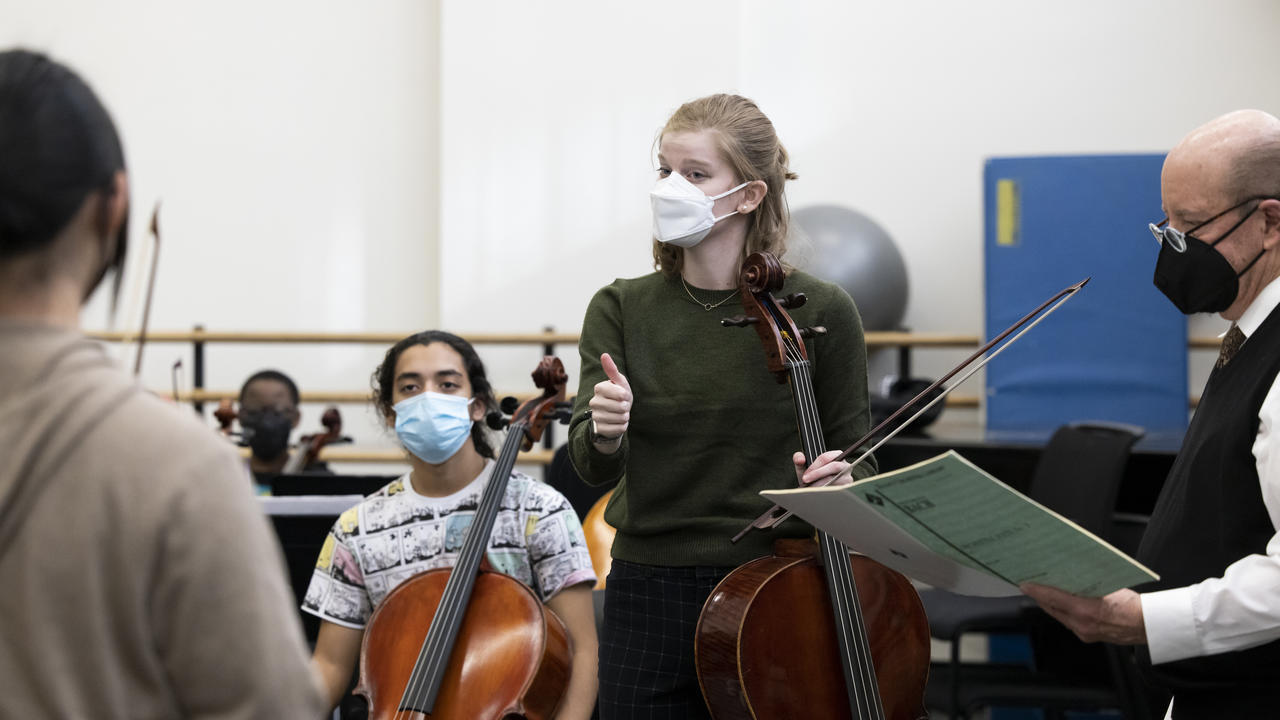A Unique Collaboration
One of the final concerts of Juilliard’s academic year is the result of a unique musical collaboration. On May 14 at the Cathedral of St. John the Divine, students from the Historical Performance department and the Music Advancement Program Chorus will premiere MAP: A New World, created for them by Francisco Nuñez, the founder and director of the Young People’s Chorus of New York City. The libretto was written by Monique Truong using the words of MAP students, and the music was inspired by early musical traditions from the Americas, including from many countries represented by the families of the MAP student body. While sometimes Early Music is a term reserved only for Western European musical traditions, the May 14 MAP of the World concert is part of an effort to respectfully embrace and honor broader early musical traditions while highlighting a wonderful Juilliard collaboration.
—Adrienne Hyde

A Brainstorm Blossoms
Second-year Historical Performance cellist and gambist Adrienne Hyde’s journey into early music began, she says, when “as a 12-year-old, I had the privilege to be exposed to the viola da gamba at a baroque concert. That early experience planted an interest that has become the basis of my career.” A few years later, when Hyde was a first year at Eastman, her orientation leader happened to bring her to a Baroque Ensemble meeting, and she soon became obsessed with the baroque cello. It was a journey, she notes, that was made possible by access to musical opportunities as well as to ongoing scholarship support throughout her musical education. Fast-forward to Hyde’s first year at Juilliard, when the combination of a sudden need for a cello graduate student to help out in the Music Advancement Program (MAP) and Historical Department conversations about issues of equity and inclusion led to another moment of serendipity as a bond grew between the departments housing the youngest and oldest students in the school.
By Adrienne Hyde
Though rehearsals have only just begun on MAP: A New World, some of the groundwork for this interdepartmental enterprise was laid in fall 2020, my first year at Juilliard. I had signed up to be a Morse Teaching fellow, and there was an urgent opening for a cello fellow in the Music Advancement Program (MAP), Juilliard’s Saturday program for middle and high school students from backgrounds traditionally underrepresented in classical music. I was honored to join a program with such an important mission and delighted to begin my new role mentoring the fantastic cello students in the MAP String Ensemble. Also that fall, my fellow students and I were meeting with the Historical Performance (HP) faculty regularly about developing equity, diversity, inclusion, and belonging goals for our department, and in one session, I suggested we give some baroque bows to MAP for use in the MAP String Ensemble.
The Early Music community struggles with pipeline issues even more than the larger classical community. Access to early instruments, bows, and other equipment is generally restricted to students already pursuing music at larger universities with the resources to purchase and maintain this equipment for their students. Several organizations in the U.S. have been working to address these access and equity issues: Early Music America, the Viola da Gamba Society of America, and Inclusive Early Music among them. This support comes in many forms, including rental instruments, educational grants, and community engagement.
When I made that suggestion about the baroque bows, I didn’t expect anything to come of it—in fact, I sent Rebecca Reuter, MAP’s administrative director, a panicky email afterward, hoping I hadn’t spoken out of turn. But then what began as a brainstorm blossomed into reality as HP lent some baroque bows to MAP, enabling the MAP String Ensemble to begin rehearsing with baroque bows in December 2020! My classmate Kako Miura (Pre-College ’13; BM ’17, violin), also a MAP fellow, and I held several intensives where we helped students comfortably hold the bows, explained principles of style, and discussed historical context. We also visited studio classes and coached students privately. And last spring, we developed an elective course for MAP students, Demystifying the Baroque and Beyond, where we guided students through basic research skills and invited them to cite what they learned from reading historical treatises in their interpretations of their solo music.
These interdepartmental connections and a lot of student hard work resulted in the MAP Baroque Ensemble—an elective for 20 MAP students who wanted to dive deeper into playing larger ensemble repertoire in a historically informed style. The students who signed up played a range of instruments—from tuba to saxophone and everything in between—many of which do not have baroque counterparts; Kako arranged music by Valentini (1582–1649) and Praetorius (1571–1621) so everyone could participate. And last June, the MAP String Ensemble performed a Concerto Grosso by Handel (1685–1759) at Damrosch Park, with students using baroque bows, playing solos, and showing off their historically informed style, all while performing without a conductor. This year, as the MAP String Ensemble expanded, so did our collection of bows for the students when Susan Laird Robinson (BS ’62, piano; MS ’64, harpsichord) graciously donated a full set for MAP’s use.
MAP’s mission is, in part, to broaden access by bringing students from diverse backgrounds into Juilliard while they are in the early stages of their musical development and to provide them with resources and support to succeed in their education. The greatest part of being a MAP fellow has been helping to create an environment where students never have to question whether they deserve a seat at Juilliard’s table. And when we increase access to historical instruments and equipment, we likewise strengthen our early music community.
Adrienne Hyde is a second-year Historical Performance cellist and gambist